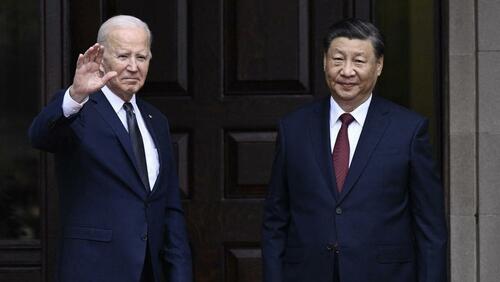
Authored by James E. Fanell and Bradley A. Thayer via American Greatness,
Ronald Reagan’s query to the American people in his October 28, 1980, debate with incumbent President Jimmy Carter was so simple and so devastating that it is still employed today: “Are you better off than you were four years ago?” While most Americans are far worse off today than they were four years ago, with rising prices, inflation, a hollow economy, and unchecked immigration, so too are the U.S., its allies, and its partner’s national security interests, which are far worse off than they were four years ago.
Four years ago, there was stability in Europe, the Middle East, and the Indo-Pacific. Now Europe’s “long peace,” that is, no major war in Europe since 1945, has been shattered by Russia’s horrific invasion of Ukraine. This war has resulted in the deaths of over one million humans and the displacement of millions more. The Middle East is roiling with conflict due to Hamas’ October 7, 2023, unprovoked attack on Israel and its consequences—the Iranian-backed Houthis interdiction of international shipping in the Gulf of Aden and the Red Sea, the attacks from Hezbollah in Lebanon and ultimately unprecedented attacks from Iran against Israel with drones and missiles. The Indo-Pacific is rife with unrest principally due to the People’s Republic of China’s (PRC) hyper-aggression against key U.S. allies and partners like India, Japan, the Philippines, and Taiwan, and against the American people themselves.
The cause of this instability is the Biden-Harris administration’s ideological obsession to “manage America’s decline” and the subsequent policies they adopted in the last almost four years. The Biden-Harris administration failed to deter the Russian invasion of Ukraine in February 2022. This war is a humanitarian nightmare for all concerned; it is a stalemated conventional conflict, evincing an intensity of combat not seen in Europe since 1945. The war also entails the risk of nuclear escalation, the tremendous cost of which the U.S. and its NATO allies would not escape. In addition, this administration has fundamentally failed to support Israel by not holding Iran to account—even worse by providing Tehran the funding to expand their terrorism against Americans.
However, in the pantheon of Biden’s failures, it is towards the PRC that the Biden administration has made its greatest foreign policy fiascos. The Biden-Harris administration has continued the failed “Engagement” policies with the PRC that have aided the Chinese Communist Party (CCP) at a time of great peril. The Biden-Harris administration ignores the existential nature of the CCP threat because it seeks to continue the Engagement school of thought through what we call the Biden-Harris administration’s “neo-Engagement” policy.
With the exception of the Trump presidency, Engagement has been the dominant U.S. approach to the PRC since Bill Clinton. It asserts that the PRC is not an existential threat to the U.S. Far from it—the Engagement school contends the Sino-American relationship should be cooperative. Any troubles may be addressed by more cooperation with the PRC and accommodation of the interests of the CCP to sustain that cooperation. In essence, the Engagers are appeasers. Unfortunately, their arguments are ubiquitous and dominate U.S. foreign policy toward the PRC. Engagement dominates Wall Street, foundations, think tanks, universities, media, Silicon Valley, K Street, major law firms, and government. Even after the fiasco of allowing a PRC intelligence, surveillance, and reconnaissance balloon to fly over the entirety of America and the conga line of Biden-Harris cabinet officials traveling to Beijing to kowtow before Xi Jinping, the nadir was the November 2023 meeting between Biden and Xi near San Francisco. Beyond the obsession by Biden-Harris to resume military-to-military exchanges despite the People’s Liberation Army’s increased threatening behavior, 400 of America’s richest business leaders attended a dinner with the PRC’s dictator—Xi Jinping. These “titans” of America’s economy gave the CCP dictator two standing ovations while Xi explained his vision of tyranny—on American soil—and how the American business elite could help him sustain it.
The failed Biden-Harris neo-Engagement policies have allowed the CCP to escape the costs of its many decades of misrule but also provided the window for the CCP’s hyper-aggression over the last four years. Since assuming office, the Biden-Harris administration has overseen and done nothing as the PRC built over 300 nuclear Intercontinental Ballistic Missiles (ICBM) silos in central and western China, upgraded the submarine-launched ballistic missiles (SLBM) aboard their sea-based leg of their triad, expanded their ballistic missile submarine production facilities, and introduced a new nuclear bomber, the H-20. This aircraft very closely resembles the B-2 stealth bomber. Additionally, the Biden-Harris regime has sat by as PLA Air Force H-6 bombers have for the first time flown nuclear bomber profiles with their Russian Long Range Aviation counterparts into the Alaskan Air Defense Identification zone.
By every metric, the CCP is flexing its strategic muscles by expanding its nuclear arsenal and strategic reach. The PRC continues to agress relentlessly against U.S. national security interests. While the pace of their aggression is quickening, the Biden-Harris administration is cutting the size of the Department of Defense. For example, Biden-Harris continues to decommission more warships than it builds, as demonstrated by their Fiscal Year 2025 budget that procures just six warships, the lowest number of any budget submission since 2006.
This degradation of America’s maritime power is especially pernicious as the situation in the South China Sea, near Scarborough Shoal or Sabina Shoal, is dramatically worsening. Likewise, the PLA is increasing its pressure on Taiwan through unceasing operations to prepare for an invasion. In the past month, the PLAAF violated Japanese territorial waters for the first time ever. Moreover, the PLAN and Russian Navy sailed into the Gulf of Alaska, while it has been confirmed that PLA is supplying Russia with military weapons to aid Moscow in its war against Kyiv. There are also credible reports, including from the South Korean Minister of Defense, that the North Koreans are directly aiding the Russian war effort.
In his famous debate with Carter, Reagan also asked Americans if they believed America was as respected and whether America was as strong as four years ago. Once again, the answer to that question today is no. America was far more respected by its foes and was stronger four years ago than today. America was seen by its key allies in Europe, the Middle East, and the Indo-Pacific as a far better, more reliable, and more confident ally than today. The result is that a Harris presidency would continue these neo-Engagement policies to embolden enemies and continue to punish allies and partners. Only a Trump presidency will end failed policies of neo-Engagement and return the U.S. to the Reaganesque certainty of the previous Cold War that “the U.S. wins, the CCP loses.”
***
James E. Fanell and Bradley A. Thayer are authors of Embracing Communist China: America’s Greatest Strategic Failure. The views expressed are their own.
Authored by James E. Fanell and Bradley A. Thayer via American Greatness,
Ronald Reagan’s query to the American people in his October 28, 1980, debate with incumbent President Jimmy Carter was so simple and so devastating that it is still employed today: “Are you better off than you were four years ago?” While most Americans are far worse off today than they were four years ago, with rising prices, inflation, a hollow economy, and unchecked immigration, so too are the U.S., its allies, and its partner’s national security interests, which are far worse off than they were four years ago.
Four years ago, there was stability in Europe, the Middle East, and the Indo-Pacific. Now Europe’s “long peace,” that is, no major war in Europe since 1945, has been shattered by Russia’s horrific invasion of Ukraine. This war has resulted in the deaths of over one million humans and the displacement of millions more. The Middle East is roiling with conflict due to Hamas’ October 7, 2023, unprovoked attack on Israel and its consequences—the Iranian-backed Houthis interdiction of international shipping in the Gulf of Aden and the Red Sea, the attacks from Hezbollah in Lebanon and ultimately unprecedented attacks from Iran against Israel with drones and missiles. The Indo-Pacific is rife with unrest principally due to the People’s Republic of China’s (PRC) hyper-aggression against key U.S. allies and partners like India, Japan, the Philippines, and Taiwan, and against the American people themselves.
The cause of this instability is the Biden-Harris administration’s ideological obsession to “manage America’s decline” and the subsequent policies they adopted in the last almost four years. The Biden-Harris administration failed to deter the Russian invasion of Ukraine in February 2022. This war is a humanitarian nightmare for all concerned; it is a stalemated conventional conflict, evincing an intensity of combat not seen in Europe since 1945. The war also entails the risk of nuclear escalation, the tremendous cost of which the U.S. and its NATO allies would not escape. In addition, this administration has fundamentally failed to support Israel by not holding Iran to account—even worse by providing Tehran the funding to expand their terrorism against Americans.
However, in the pantheon of Biden’s failures, it is towards the PRC that the Biden administration has made its greatest foreign policy fiascos. The Biden-Harris administration has continued the failed “Engagement” policies with the PRC that have aided the Chinese Communist Party (CCP) at a time of great peril. The Biden-Harris administration ignores the existential nature of the CCP threat because it seeks to continue the Engagement school of thought through what we call the Biden-Harris administration’s “neo-Engagement” policy.
With the exception of the Trump presidency, Engagement has been the dominant U.S. approach to the PRC since Bill Clinton. It asserts that the PRC is not an existential threat to the U.S. Far from it—the Engagement school contends the Sino-American relationship should be cooperative. Any troubles may be addressed by more cooperation with the PRC and accommodation of the interests of the CCP to sustain that cooperation. In essence, the Engagers are appeasers. Unfortunately, their arguments are ubiquitous and dominate U.S. foreign policy toward the PRC. Engagement dominates Wall Street, foundations, think tanks, universities, media, Silicon Valley, K Street, major law firms, and government. Even after the fiasco of allowing a PRC intelligence, surveillance, and reconnaissance balloon to fly over the entirety of America and the conga line of Biden-Harris cabinet officials traveling to Beijing to kowtow before Xi Jinping, the nadir was the November 2023 meeting between Biden and Xi near San Francisco. Beyond the obsession by Biden-Harris to resume military-to-military exchanges despite the People’s Liberation Army’s increased threatening behavior, 400 of America’s richest business leaders attended a dinner with the PRC’s dictator—Xi Jinping. These “titans” of America’s economy gave the CCP dictator two standing ovations while Xi explained his vision of tyranny—on American soil—and how the American business elite could help him sustain it.
The failed Biden-Harris neo-Engagement policies have allowed the CCP to escape the costs of its many decades of misrule but also provided the window for the CCP’s hyper-aggression over the last four years. Since assuming office, the Biden-Harris administration has overseen and done nothing as the PRC built over 300 nuclear Intercontinental Ballistic Missiles (ICBM) silos in central and western China, upgraded the submarine-launched ballistic missiles (SLBM) aboard their sea-based leg of their triad, expanded their ballistic missile submarine production facilities, and introduced a new nuclear bomber, the H-20. This aircraft very closely resembles the B-2 stealth bomber. Additionally, the Biden-Harris regime has sat by as PLA Air Force H-6 bombers have for the first time flown nuclear bomber profiles with their Russian Long Range Aviation counterparts into the Alaskan Air Defense Identification zone.
By every metric, the CCP is flexing its strategic muscles by expanding its nuclear arsenal and strategic reach. The PRC continues to agress relentlessly against U.S. national security interests. While the pace of their aggression is quickening, the Biden-Harris administration is cutting the size of the Department of Defense. For example, Biden-Harris continues to decommission more warships than it builds, as demonstrated by their Fiscal Year 2025 budget that procures just six warships, the lowest number of any budget submission since 2006.
This degradation of America’s maritime power is especially pernicious as the situation in the South China Sea, near Scarborough Shoal or Sabina Shoal, is dramatically worsening. Likewise, the PLA is increasing its pressure on Taiwan through unceasing operations to prepare for an invasion. In the past month, the PLAAF violated Japanese territorial waters for the first time ever. Moreover, the PLAN and Russian Navy sailed into the Gulf of Alaska, while it has been confirmed that PLA is supplying Russia with military weapons to aid Moscow in its war against Kyiv. There are also credible reports, including from the South Korean Minister of Defense, that the North Koreans are directly aiding the Russian war effort.
In his famous debate with Carter, Reagan also asked Americans if they believed America was as respected and whether America was as strong as four years ago. Once again, the answer to that question today is no. America was far more respected by its foes and was stronger four years ago than today. America was seen by its key allies in Europe, the Middle East, and the Indo-Pacific as a far better, more reliable, and more confident ally than today. The result is that a Harris presidency would continue these neo-Engagement policies to embolden enemies and continue to punish allies and partners. Only a Trump presidency will end failed policies of neo-Engagement and return the U.S. to the Reaganesque certainty of the previous Cold War that “the U.S. wins, the CCP loses.”
***
James E. Fanell and Bradley A. Thayer are authors of Embracing Communist China: America’s Greatest Strategic Failure. The views expressed are their own.
Loading…





